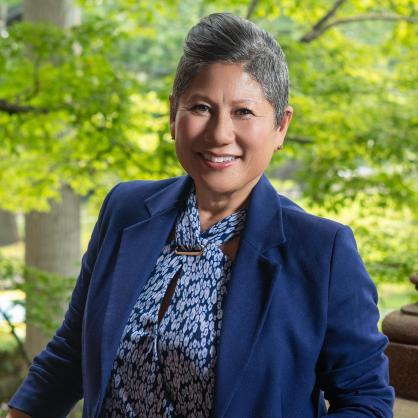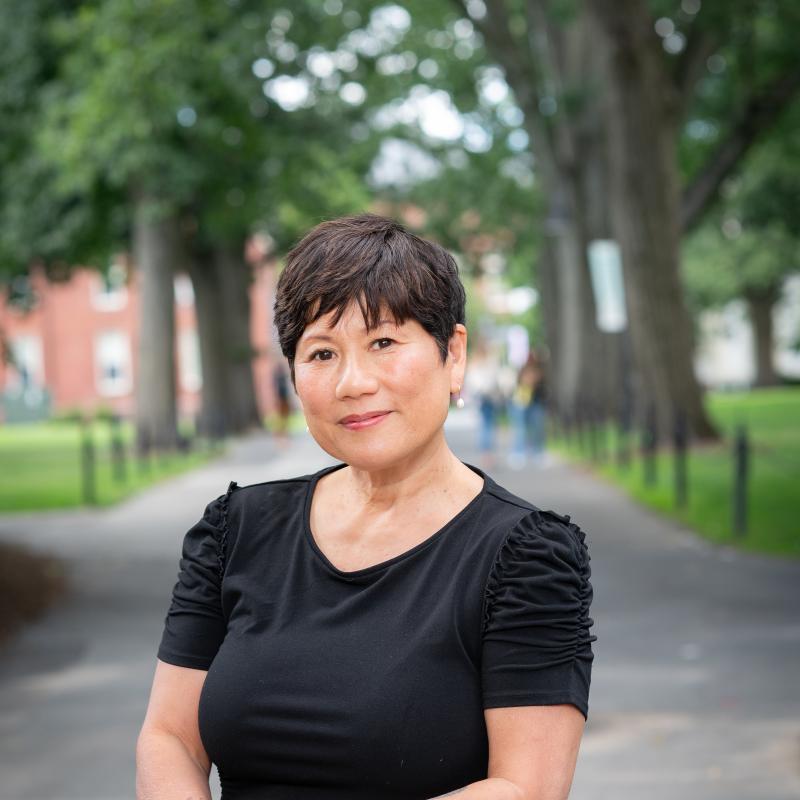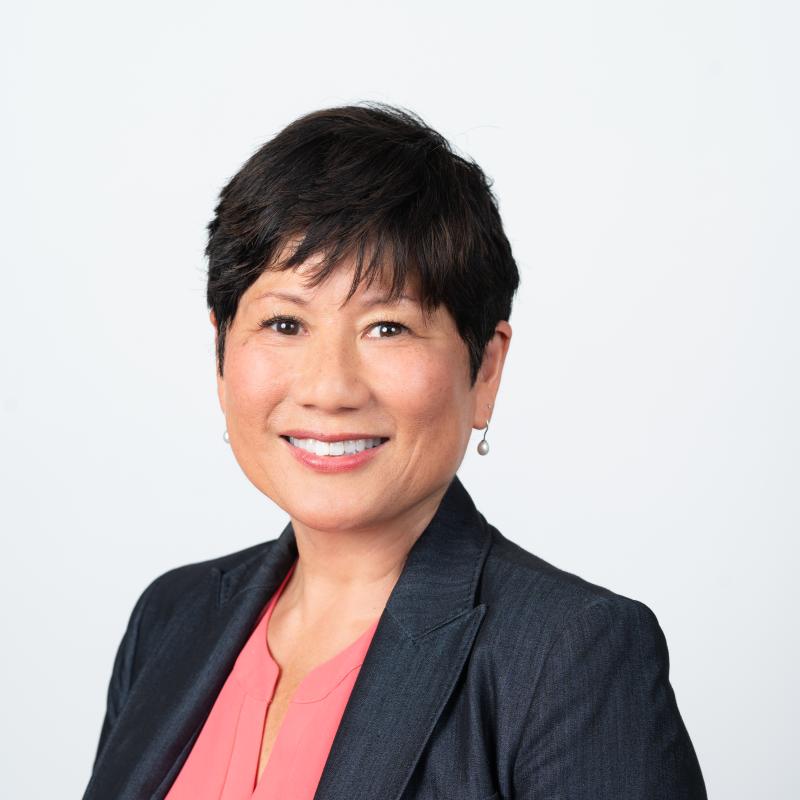Marianne R.M. Yoshioka, M.S.W., MBA, Ph.D., LCSW
Phone: 413-585-7977
Email: sswdean@smith.edu
Pronouns: she/her

B.A., University of Western Ontario
M.S.W., University of Michigan
MBA, Isenberg School of Management, University of Massachusetts Amherst
Ph.D., Florida State University
Dean Marianne Yoshioka arrived at the Smith College School for Social Work in 2014. Prior to Smith College, Yoshioka spent 18 years on the faculty of the New York City’s Columbia School of Social Work and also served as the school’s associate dean of academic affairs. Originally trained as a clinical social worker, Yoshioka focused her research on the areas of addiction, family therapy, HIV/AIDS, family violence in Asian communities, and the design and development of culturally-tailored intervention. She has received related research funding from the National Institute of Mental Health, as well as private foundations, and has published her findings extensively in an effort to advance knowledge of and services for underrepresented communities.
Yoshioka has held board positions with the National Association of Deans and Directors of Social Work, the NASW, social service organizations, and has participated in numerous working groups and think tanks. The strong clinical social work training programs and anti-racism mission of the Smith School for Social Work make Yoshioka an excellent fit for our institution, as her work as a clinician, researcher and administrator demonstrates a similar commitment to anti-oppression and inclusion.
Yoshioka has taught in the areas of clinical practice, advanced research methods, the developmental life course and practice with battered women. She received her Ph.D. from Florida State University’s School of Social Work, her M.S.W. from the University of Michigan and her B.A (honors) from Canada’s University of Western Ontario.
Books and Articles
Gundanna, A., Yoshioka, M.R., & Ghosh, S. (2011). Social Exclusion as a Form of Regulation: Experiences and Lessons Learned in the New York Asian American Community. In J. H. Schiele (Ed)., Social Welfare Policy: Regulation and Resistance among People of Color. Thousand Oaks, CA: Sage.
Yoshioka, M. R. and Noguchi, E. (2009) The Developmental Life Course Perspective: A conceptual and organizing framework for HBSE. Journal of Human Behavior and the Social Environment, 19: 7, 873-884.
Kramer, E. J., Ivey, S. L., Raj, A., & Yoshioka, M. R. (2009) Intimate Partner Violence Among Asian Americans: The relevance of culture. In B. Bateman, H. Ho-Asjoe, & N. Abesamis (Eds). Handbook of Asian American Health. NY: Praeger/Greenwood.
Yoshioka, M. R. (2008) Cultural diversity. In J. Keeling & T. Mason (Eds.), Domestic Violence. Berkshire, England: Open University Press.
Lewis, M. W., Cavanagh, P. K., Ahn, G., & Yoshioka, M. R. (2008). Subjective effect of terrorist attacks on pregnant women following September 11, 2001: Is cumulative history of interpersonal violence important? Journal of Interpersonal Violence, 23 (6), 780-797.
Jin, X., Eager, M. and Yoshioka, M.R. (2007). Consequences of early exposure to violence in the family of origin: Chinese immigrant male batterers vs. Non-violent controls. Journal of Family Violence, 22(4), 211-222.
Nguyen, T., & Yoshioka, M. R. (2006). Alcoholism level differences between Vietnamese batterers and non-batterers. Journal of Family Violence, 21(6), 401-406.
Yoshioka, M. R. & Choi, D. Y. (2005). Culture and interpersonal violence research: Paradigm shift to create a full continuum of domestic violence services. Journal of Interpersonal Violence, 20(4), 513-519.
Ivey, S., Kramer, E., & Yoshioka, M.R. (2005). Violence against women in the family: Immigrant women and the U.S. health care system. In C. Rabin (Ed.), Understanding gender, culture, and ethnicity in the helping process: Practitioners’ experiences from around the world. Brooks-Cole.
Yoshioka, M.R., & Shibusawa, T. (2004). Psychosocial Measures for Asian Pacific Americans. In A. Roberts & K Yeager (Eds.), Evidence-based practice manual (pp. 488-495). New York, NY: Oxford University Press.
Yoshioka, M.R, Gilbert, L., & El-Bassel, N. (2003). Social support and disclosure of abuse: A comparison of African American, Hispanic, and South Asian battered women. Journal of Family Violence, 18(3), 171-180.
Yoshioka, M. R., & Shibusawa, T. (2002). The Life Distress Inventory: A psychometric examination. Research on Social Work Practice, 12(6), 789-804.
Yoshioka, M.R., DiNoia, J., & Ullah, K. (2001). Attitudes toward marital violence: An examination of four Asian communities. Violence against Women, 7(8), 900-926.
Yoshioka, M. R. & Schustack, A. (2001). Disclosure of HIV status: Cultural Issues of Asian patients. AIDS patient care and STDS, 15(2), 77-82.
El-Bassel, N., Yoshioka, M. R., & Moultrie, C. (2001). Contemporary Social Problems. In R. A. Feldman & S. B. Kammerman (Eds.) Columbia University School of Social Work: A Centennial Celebration (pp. 324-344) New York, NY: Columbia University Press.
Yoshioka, M. R. (2000). Substantive differences in the assertiveness of low income African American, Hispanic, and Caucasian women. Journal of Psychology, 134(3), 243-260.
Yoshioka, M. R. (1999). The use of developmental research methods to design culturally competent interventions. Journal of Multicultural Social Work, 8(3/4), 113-128.
Quadagno, D., Harrison, D. F., Eberstein, I., Sly, D., Yoshioka, M., & Soler, H. (1996/97). The development and implementation of a cognitive-based intervention aimed at culturally diverse women at risk for HIV/AIDS. International Quarterly of Community Health Education, 16(3), 271-285.
Thomas, E.J., Yoshioka, M.R., & Ager, R.D. (1996). Spouse enabling of alcohol abuse: Assessment and modification. Journal of Substance Abuse, 8(1), 61-80.
Sells, S., Smith, T.E., Coe, M.J., Yoshioka, M.R., & Robbins, J. (1994). An ethnography of couple and therapist experiences in reflecting team practice. Journal of Marital and Family Therapy, 20, 247-266.
Smith, T.E., Yoshioka, M.R., & Winton, M. (1993). A qualitative understanding of reflecting teams. I: Clients' perspectives. Journal of Systemic Therapies, 12(3), 28-43.
Smith, T.E., Winton, M., & Yoshioka, M.R. (1992). A qualitative understanding of reflecting teams II: Therapist perspectives. Contemporary Family Therapy, 14(5), 419-432.
Yoshioka, M.R., Thomas, E.J., & Ager, R.D. (1992). Nagging and related drinking control efforts of spouses of uncooperative alcohol abusers: Assessment and modification. Journal of Substance Abuse, 4(3), 309-318.
Thomas, E.J., Adams, K.B., Yoshioka, M.R., & Ager, R.D. (1990). Unilateral relationship enhancement in the treatment of spouses on uncooperative alcohol abusers. The American Journal of Family Therapy, 18(4), 334-344.
Thomas, E.J., & Yoshioka, M.R. (1989). Spouse interventive confrontations in unilateral family therapy for alcohol abuse. Social Casework, 70, 340-347.
Yoshioka, M.R., & Wilson, P.A. (1989). Responses to DES exposure: The development of effective practice. ARETE, 14(2), 12-22.
Technical Reports
Center for Substance Abuse Treatment. Substance Abuse Treatment and Family Therapy. Treatment Improvement Protocol (TIP) Series, No. 39. DHHS Publication No. (SMA) 04-3957. Rockville, MD: Substance Abuse and Mental Health Services Administration, 2004 (E. Kaufman, chair; M.R. Yoshioka, co-chair)
Yoshioka, M. R. & Dang. Q. (2000). The Asian family violence report: A study of the Cambodian, Chinese, Korean, South Asian, and Vietnamese communities in Massachusetts. Boston, MA: The Asian Task Force Against Domestic Violence.
Yoshioka, M.R., Chin, J., & Manzon-Santos, J. (2000). Disclosing status and accessing social and institutional support: HIV+ Asian and Pacific Islanders in New York City. http://www.hrsa.gov/hab/evaluation.html (click SPNS, SPNS Snapshots, APICHA)
Yoshioka, M. R. (1996). Measuring the assertive behavior of low income, culturally diverse women: Implications for culturally competent practice. Proceedings of the Eighth National Symposium on Doctoral Research in Social Work. Columbus: Ohio State University.
Thomas, E. J., Ager, R. D., & Yoshioka, M. R. (1996). Measuring spouse sobriety influence. Issues in Substance Abuse: The Newsletter of the NASW Alcohol, Tobacco, and Other Drugs Section.
Thomas, E.J., Yoshioka, M.R., & Ager, R.D. (1994a). Abstract of the Life Distress Inventory. In K. Corcoran & J. Fischer (Eds.), Measures of Clinical Practice: A Sourcebook (2nd ed.). New York: Free Press.
Thomas, E.J., Yoshioka, M.R., & Ager, R.D. (1994b). Abstract of the Spouse Enabling Inventory. In K. Corcoran & J. Fischer (Eds.), Measures of Clinical Practice: A Sourcebook (2nd Ed.). New York: Free Press.
Thomas, E.J., Yoshioka, M.R., & Ager, R.D. (1994c). Abstract of the Spouse Sobriety Influence Inventory. In K. Corcoran & J. Fischer (Eds.), Measures of Clinical Practice: A Sourcebook (2nd Ed.). New York: Free Press.


